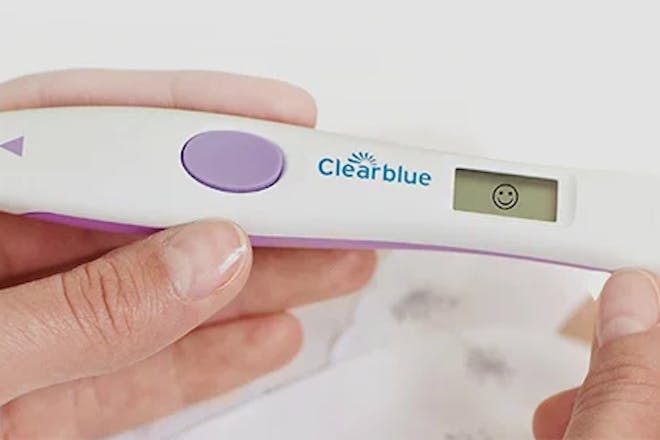13DPO: pregnancy symptoms and testing at thirteen days post ovulation

This page contains affiliate links, which means we may earn a small amount of money if a reader clicks through and makes a purchase. All our articles and reviews are written independently by the Netmums editorial team.
Wondering what symptoms to expect at 13dpo? Trying to figure out if it's time to take a pregnancy test yet? Here's everything you need to know about what to expect at thirteen days post ovulation.
You’ve nearly done it! The end of the Two-Week-Wait is in sight… in fact it’s just one day away. By now you likely already know the term ‘dpo’, or ‘days past ovulation’, but if you don't, it basically is what it says: it’s a measure of how many days have gone by since you ovulated.
The NHS tells us that ovulation usually occurs roughly two weeks before your next period would start. Of course, this varies because every woman’s body works differently, so if you need help working out when you last ovulated, or when to expect it next, you can give our ovulation calculator a go. You also might want a more detailed breakdown of how ovulation works, so you really can get a handle on what’s happening.
If you’re already on top of your cycle and know that you’ve reached 13dpo, then congrats! You’ve nearly reached the finish line. Knowing what is going on in your body might just help you get there with some of your sanity left intact.
FREE NEWBORN NAPPIES
That’s why we’ve brought together the research from the NHS, Healthline, and other fertility experts to help you to understand the symptoms you might experience at 13dpo, when you can start accurately testing, and just what’s going on in there.
What’s happening in my body at 13dpo?
Generally, one of three things will be happening in your body. We can’t tell you for sure which it is because it depends on factors like how long your menstrual cycles are, how regular they are, and when you last had sex. But you can rest assured that most likely one of the following options is happening at 13dpo.
At 13dpo, it’s possible that:
- an egg has been released and made it down the fallopian tube without being fertilised (you’re not pregnant)
- an egg has been released and fertilised, but hasn't yet implanted in your womb (you may be pregnant)
- an egg has been fertilised, and has implanted in your womb (you are pregnant)
Let’s have a look at the details of how it all normally works:

The day that you ovulate, one of your ovaries will release an egg. This egg makes it way to your fallopian tube, and starts a 24-hour journey to your womb. That’s how long sperm have to fertilise it.
Sperm can survive in your body for a maximum of five days, so if you’ve had sex up to five days before your ovulated, or within 24 hours after, then there is a chance that the sperm have reached the egg and fertilised it.
If the egg reaches your womb without being fertilised, then it will leave your body when your next period happens. But if it meets sperm on its way there, and one of them manages to fertilise it, then it might implant into the wall of your uterus. Implantation generally occurs between 6-12 days post ovulation, but it can sometimes happen both before and after this window.
If the egg was fertilised, and if it implanted into your uterus, you body will begin to produce hCG, or human chorionic gonadotropin, also known as the pregnancy hormone. hCG is what pregnancy tests are looking for in your pee.
According to Healthline, it can take about 7-12 days after implantation for hCG to build up to levels that normal pregnancy tests can detect. So even if you’re still getting BFNs at this stage, that’s no guarantee that you’re not actually pregnant, especially if you had a late implantation or ovulated a bit later than you thought.
hCG build-up is also what causes some of the early pregnancy symptoms you may experience, like fatigue, sore or tender breasts, and nausea.
What are the symptoms I might experience at 13dpo?
Now that you’re near the end of the TWW, there’s more of a chance that, if you’re pregnant, your hCG levels will be high enough for it to start causing early pregnancy symptoms. Even so, there's still a good chance that you're not feeling any symptoms yet.
If you’re not feeling any of the symptoms below yet, keep in mind that there’s a pretty big window in which implantation can happen, and it takes time for hCG to build up.
It's also worth remembering that quite a few of the early pregnancy symptoms are frustratingly similar to the symptoms of PMS, which can make symptom spotting at this stage of the process a bit tricky.
According to the NHS here are some of the symptoms that you might experience:
- feeling or being sick
- feeling more tired than usual
- sore or tender breasts
- peeing more often
- strange tastes, smells or cravings
Learn more about the early signs of pregnancy.
What have other Netmums experienced?
There are lots of other mums-to-be sharing their experiences of being at 13dpo on our Forum. Here’s what some of the members of our community have shared about their symptoms and experiences at this stage of the TTC process:
‘I can't believe it! I'm having a baby! Now, to put my experiences to some use! Here is my 2 cents. Firstly I was literally convinced I was getting my period. I had what I thought was PMS. For real. My 'symptoms' have been eerily similar to simply being in the luteal phase. Whilst we are in luteal phases, a lot people search for information regarding a healthy luteal phase. Mine is between 10-12 days.. When it's behaving itself... CM the amount of EWCM I have is negligible. I got my BFP, I used Conceive Plus. I also agree stacks of salads and veggies this month. The amount of CM I had after ovulation was the same as always, milky-ish, kinda watery and a fairly regular amount each day. It's now yellowy and stringy globby, a bit like snot! Cramping is like period cramps. I did not have sore boobs, nor am I sick or tired.
‘1-6 DPO Felt normal had milky Cm... Normal amount.
7 DPO Cramping and bad backache, a little pink when I wiped.
8 DPO Heightened sense of smell for tea and coffee.
9 DPO Brownish CM on one occasion, like before a period
10 DPO a faint shadow on an IC test backache from HELL
11 DPO BACKACHE IS GOING TO KILL ME
12 DPO IC tests faint but there, small amounts of yellowy CM.
13DPO Did a first response, came straight up! As did CB Digital. Backache subsiding. small amounts of yellowy cm.’
- Anon (later posts confirmed that she was pregnant)
‘I'm 13dpo, I've been having on and off nausea, mild lower back pain and awful headaches, with mild lower abdo twinges. I've had a BFN 4 days ago but perhaps it was too soon!
I'm due my AF tomorrow and usually dry up before but today felt so wet down there I kept thinking AF arrived but its just watery really. I've also been extremely sweaty today 😅 and now laid with very mild lower cramps.. could this be implantation?!'
- Tara L (later posts indicate she was not pregnant)
‘I'm 13dpo today. AF is due on the 17th (today the 14th). Normally before AF, I have noticeable PMS that are typically the same every month (I am certain of this because I always keep track anyways).
'I've been feeling quite different the past few days, the stand out ones being extra moody and feeling nauseous. Also, I haven't got the usual AF cramps but like short and stretchy feelings in my lower abdomen/uterus and felt it a little in my back yesterday.
'Anyone want to symptom share because I am getting really impatient and am debating to test?!’
- Victoria T (later posts indicate she was pregnant)
‘First time ttc BFN today and I am 13dpo. I’ve had sensitive nipples after ovulation and then a few days later my breast got sore and still are. Today AF is due and when I went to the bathroom today and wiped I got a lot of clear sticky CM. Am I out this month?’
- Farm S (later posted to say she was not pregnant)
Can I take a pregnancy test at 13dpo?
The NHS recommends not taking a pregnancy test until the day that you’re expecting your next period to start. This is usually around 14dpo if you have an average 28-day menstrual cycle. That means that at 13dpo it’s just one day too early to take a pregnancy test.
There are some extra-sensitive tests that might give you a result from 9dpo, though the longer you wait the more accurate they are. A negative result at this stage doesn’t always mean that you’re not pregnant, especially if you had a late implantation.
That’s not to say you can’t get a BFP now, as you’re potentially at the start of when your hCG levels will be high enough to be picked up, but it’s still best to wait a bit longer. The longer you wait, the more likely it is that you’ll get an accurate result. And again, don’t be disheartened if you get a BFN. It isn’t over until Aunt Flo sings!
Learn more about when to take a pregnancy test.
How can I get through the TWW?
Just one more day! If you’ve managed to make it this far, you should congratulate yourself on holding out for so long. And if you’ve already been testing, or symptom spotting, don’t judge yourself, that’s perfectly normal and you are definitely not the only one.
As you might have already found for yourself by now, distraction is the name of the game. Whether it’s a good book, an immersive television series, or a favourite hobby, doing what you can to take your mind off the wait can be difference between spinning out and staying on top of it.
Talking it through can also be a big help. Chatting with sympathetic friends and family might help you through the last stretch. You can also find other hopeful mums-to-be sharing their experiences and symptoms in one of the Trying to Conceive Clubs on our Forum. Sharing what you’re going through, and reading other’s stories, might just help to settle your mind.
If you’re looking for more tips, we have put together a list of some of the ways to survive the TWW,. Well done on making it this far, and here’s hoping you get the BFP you’re waiting for!
More on DPO
If you want to keep an eye on your potential pregnancy symptoms and what's going in your body on each day post ovulation, check out our articles from day 1 to 19:
1DPO • 2DPO.• 3DPO • 4DPO • 5DPO • 6DPO • 7DPO • 8DPO • 9DPO • 10DPO • 11DPO • 12DPO • 13DPO • 14DPO • 15DPO • 16DPO • 17DPO • 18DPO • 19DPO





